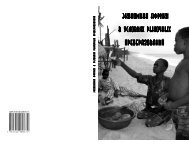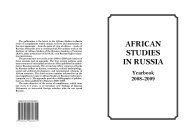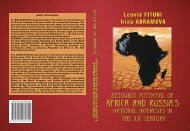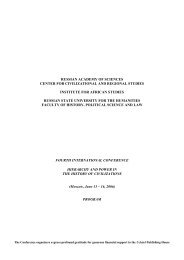Bondarenko Dmitri M. Homoarchy
Bondarenko Dmitri M. Homoarchy
Bondarenko Dmitri M. Homoarchy
Create successful ePaper yourself
Turn your PDF publications into a flip-book with our unique Google optimized e-Paper software.
37<br />
inherited within definite extended families. The matter is that a lineage<br />
which held a hereditary title could not lose it anyway, while the Obas in theory<br />
had the right to hand a non-hereditary title over to another family, though only<br />
after the death of its previous holder (with the remarkable exception of the<br />
Iyase title). The Obas appointed chiefs just formally, for, first, to be distinct,<br />
the sovereign appointed only the lineage out of which its members (officially<br />
not involved into the administrative system) selected a concrete person for<br />
granting the title. Second, due to the power of tradition and real might of the<br />
palace and town chiefs, titles were held within the same extended families<br />
(egbes) for hundreds of years (though officially every lawful Bini man could<br />
claim for a non-hereditary title [Bradbury 1957: 38; 1969: 22; Atmore and<br />
Stacey 1979: 47]).<br />
Thus in reality there was no free choice of administrators and their<br />
appointment by higher authorities. In practice, administrators were not<br />
appointed at all as well as there was no free selection of them on the societal<br />
level; they were elected within definite lineages and extended families. Only<br />
their more or less formal investiture was the Oba’s privilege and duty (compare<br />
with Weber’s points 5 and 4). The sovereign’s power over rulers of distant<br />
chiefdoms integrated into the Benin polity could be rather weak (Bradbury<br />
1957: 33; 1973: 178) and it may be reasonable to suppose (especially if one<br />
trusts the folk-lore evidence [Sidahome 1964: 49–50, 163]) that during the last<br />
turbulent centuries of the Benin Kingdom’s existence the Obas only blindly<br />
confirmed the candidatures proposed to him and this procedure in its essence<br />
transformed into a mere pro forma, the performing of an ancient ritual (“antipoint<br />
9” of Weber).<br />
The chiefs were not simple officials at the supreme ruler’s service. On<br />
the one hand, the Obas regularly established ties of relationship with them (what<br />
contradicts Weber’s point 1) marrying the titled chiefs’ daughters (Bradbury<br />
1957: 41) and giving their own daughters in marriage to the chiefs (Egharevba<br />
1956: 31; 1962). On the other hand, the chiefs constantly preserved close<br />
connections with the kinship organization and fulfilled different nonadministrative<br />
functions ascribed to them as kin units members (hence, the<br />
Benin realities did not fit point 7 of Weber). In the central bodies’ activities they<br />
also participated as representatives of their titled lineages, not as individuals<br />
(except the Uzama whose titles passed by the rule of primogeniture, at least in<br />
the ethnographically observable time [Bradbury 1964: 156]). Titled chiefs<br />
exercised control over communities through local leaders. It was unreal to dig<br />
titled chiefs up from their native social units and to send them to govern “alien”<br />
communities (iyas). Under the conditions when all the levels of socio-political<br />
complexity were penetrated by essentially community ties and relations which<br />
dominated at all of them, the division of the country into merely administrative<br />
units (including by means of transforming into administrative units communities<br />
and chiefdoms) was impossible.







